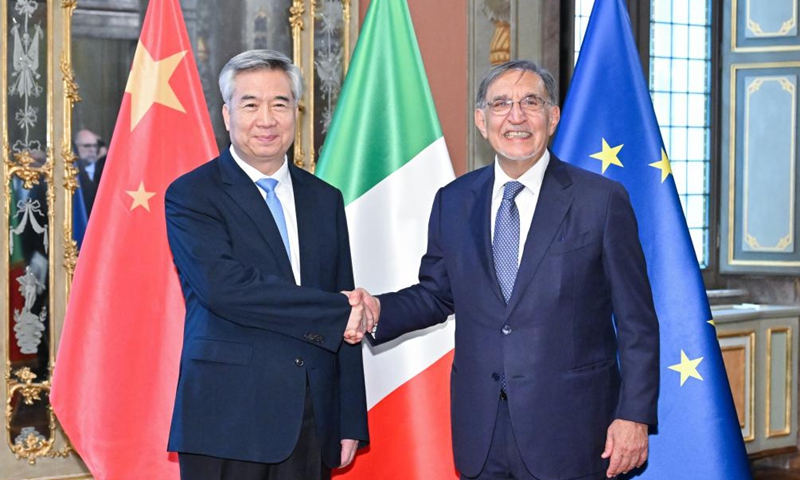Senior Chinese official vows to further ties with Italy, urges Rome to play a constructive role in China-Europe consultations

Senior Chinese official Li Xi met with Italian leaders in Rome to deepen strategic ties, marking the 20th anniversary of the China-Italy comprehensive strategic partnership and advancing cooperation in areas like green energy and digital technology.
Li, a member of the Standing Committee of the Political Bureau of the Communist Party of China (CPC) Central Committee and Secretary of the CPC Central Commission for Discipline Inspection, met with Italy's Senate President Ignazio La Russa, and Deputy Prime Minister and Foreign Minister Antonio Tajani in Rome during his visit from Wednesday to Saturday at the invitation of the Italian Senate.
During the meetings, Li highlighted the enduring ties between China and Italy, and called on the two sides to advance the consensus reached by Chinese President Xi Jinping and Italian Prime Minister Giorgia Meloni in July.
Li emphasized cooperation through the "China-Italy Action Plan," which aimed at enhancing political trust and collaboration in existing and emerging sectors like green energy, the digital economy, and artificial intelligence. He also highlighted the importance of enhancing people-to-people exchanges and multilateral coordination in multilateral arenas such as the United Nations and Group of 20 (G20) to elevate China-Italy relations.
China and Europe share extensive common interests in upholding multilateralism, addressing climate change, and promoting global economic recovery, Li said, noting that China advocates for resolving relevant economic and trade issues through consultation based on pragmatic and balanced principles.
He urged the Italian side to view China-Europe economic and trade relations "with an open attitude and a long-term perspective," and play a constructive role in China-Europe consultations and negotiations.
The visit came after a video call on October 25 between Chinese commerce minister Wang Wentao and European Commission (EC) Executive Vice-President and Commissioner for Trade Valdis Dombrovskis at the latter's request. The two sides agreed to conduct further consultations over the EU's planned additional tariffs on China-made electric vehicles (EVs) during the call.
Some 10 countries, including France, Italy, and Poland, supported imposing the tariffs on Chinese EVs of up to 35.3 percent, coming on top of existing duties of 10 percent, AFP reported. Five countries, including Germany and Hungary, voted against, while 12 abstained, including Spain and Sweden.
Italian Foreign Minister Tajani emphasized China's role as a vital economic partner, noting that Italy hopes to strengthen economic and trade exchanges with China, fostering a balanced and mutually beneficial relationship. He reiterated Italy's commitment to open economic policies and to actively working toward resolving trade frictions between Europe and China through negotiations.
The EU's imposition of additional tariffs on China-made EVs is not a purely economic and trade issue, nor is it purely a technical negotiation, Zhao Junjie, senior research fellow at the Institute of European Studies at the Chinese Academy of Social Sciences (CASS), told the Global Times.
Zhao noted that despite major differences, continued consultation should be the main way to resolve disputes.
"We need to focus on negotiations where the two sides can meet each other halfway and refrain from making unreasonable demands. It would be ideal to reach a solution that is acceptable to all," Zhao said. "But if the EU still holds an uncompromising stance, and blindly oppresses and restrains Chinese companies, we also have the toolbox to fight back."
On Thursday, He Yadong, a spokesperson for China's Ministry of Commerce (MOFCOM), said that the EU has followed many unreasonable and non-compliant practices in the anti-subsidy investigation of China-made EVs. China has always put forward a comprehensive defense and submitted a large number of comments and evidential materials to the EU, which have not been fully considered.
"Voices from the EU, such as the German chancellor, recently reiterated their opposition to tariffs on China-made EVs, which I think represents there are divergences within the EU. Also, the EC is facing pressure from the industries within the bloc, not just in the EV industry," Wu Shuocheng, a veteran automobile industry analyst, told the Global Times.
MOFCOM announced on August 21 the decision to launch a countervailing investigation into certain dairy products originating in the EU with immediate effect. In June, MOFCOM said it will launch an anti-dumping investigation into certain pork and pig by-products originating from the EU.
In June, Ksenija Simovic, senior policy adviser for trade at Copa-Cogeca, Europe's largest farming lobby, said that "this is of course not acceptable for us. The EC should make sure that once again, our sector is not the one picking up the bill for disputes concerning other sectors," according to a report by Politico.